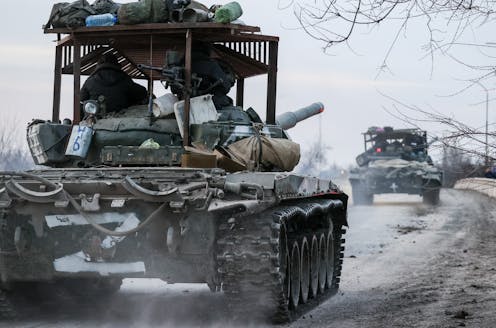Ukraine war follows after decades of warnings that NATO expansion into Eastern Europe could provoke Russia
- Written by Ronald Suny, Professor of History and Political Science, University of Michigan
 On Feb. 24, Russian tanks moving into Ukraine. Sergei MalSergei Malgavko\TASS via Getty Images)
On Feb. 24, Russian tanks moving into Ukraine. Sergei MalSergei Malgavko\TASS via Getty Images)As fighting rages across Ukraine, two versions of reality that underlie the conflict stare across a deep divide, neither conceding any truth to the other.
The more widespread and familiar view in the West, particularly in the United States, is that...

